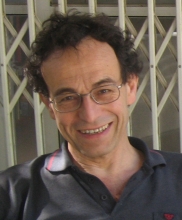ChEMS Seminar: Biomolecular Electronics: Electron Transport across Proteins

Department of Materials and Interfaces
Weizmann Institute of Science, Rehovot, Israel
Abstract: Electron transport (ETp), i.e., electronic conduction across protein monolayers, in a solid state-like measuring configuration is surprisingly efficient, and comparable to, or at times even more efficient, than via completely conjugated molecules of comparable lengths. In addition, such ETp for several, especially membrane, proteins of lengths up to 7-9 nm can be totally temperature-independent down to 10 K, if the coupling to (at least one of) the electrodes is efficient, i.e., without measurable activation barrier. Such behavior is beyond anything we know for monolayers of conjugated organics, but has been reported for up to 20 nm organic films. Thus, if contact to the external world does not limit ETp, and intraprotein processes dominate transport, there seems to be no barrier for transport, which may well be coherent, and I will present experimental results that support this idea. The apparent barrier-less transport across a protein may also have some relevance for electron transfer, ET, which nature regulates via redox chemistry, i.e., injection and extraction of electrons. This is a feature where ET and ETp can be related, because the ETp analog is the coupling to the electrodes. However, for ETp no redox process is needed, allowing its study also via non-redox proteins, such as rhodopsins, which leaves the open question why even non-redox proteins should be such efficient electronic conductors.
This work was performed in collaboration with M. Sheves & I. Pecht. Work involved/involves former group members L. Sepunaru, Xi Yu, S.Mukhopadhyay, R.Lovrincic, N.Amdursky,& present members C.Guo, J.Fereiro. & J C Cuevas, UAM, Madrid.
Bio: David Cahen studied chemistry & physics at Hebrew University of Jerusalem (HUJI), materials science & chemistry at Northwestern University, and, as a postdoc, biophysics of photosynthesis at HUJI and Weizmann Institute of Science. After joining the WIS, he specialized in alternative sustainable energy resources; his research today is on (halide perovskite) solar cells and on electron transport across peptides & proteins, and implications for bio-optoelectronics. He is a fellow of AVS and MRS. He heads WIS' Alternative Sustainable Energy Research initiative.
Host: Allon Hochbaum
Share
Upcoming Events
-
MSE 298 Seminar: Quasi-1D/2D Charge-Density-Wave Materials - From Exotic Physics to Application Prospects
-
EECS Seminar: Steering Diffusion Models for Generative AI, From Multimodal Priors to Test-Time Scaling
-
CBE 298 Seminar: Finding Catalysts of Gut Reactions - The Gut Microbiota in Disease Onset and Treatment
-
CEE Seminar: Confirming a Critical Foundation of Global Warming - Direct Observational Evidence from Space of the Impact of CO2 Growth on Infrared Spectra
-
MSE 298 Seminar: Basic Materials Science Aspects In Sustainable Metallurgy
